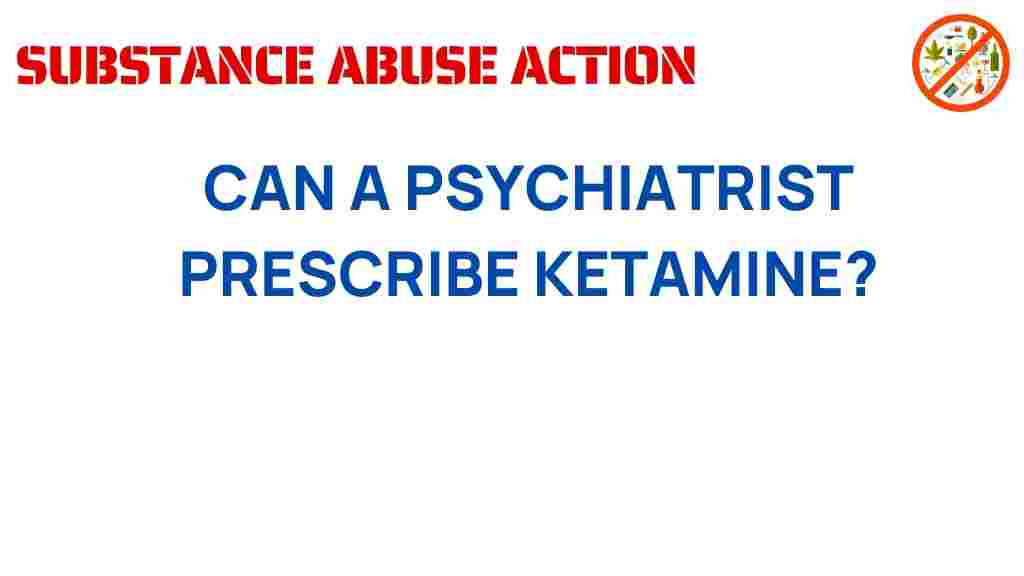Unveiling the Mystery: Can a Psychiatrist Prescribe Ketamine?
The landscape of mental health treatment is evolving, and innovative solutions are emerging to address conditions like depression and anxiety. One such solution that has gained attention is ketamine, a medication traditionally used as an anesthetic. The question that many patients and their families are asking is: can a psychiatrist prescribe ketamine for mental health treatment? In this article, we will explore the role of psychiatrists in prescribing ketamine, its use in treating various mental health disorders, and what you should know if you are considering this treatment option.
Understanding Ketamine
Ketamine is primarily known as an anesthetic agent, but it has also been studied for its rapid antidepressant effects. Unlike traditional antidepressants, which can take weeks to show results, ketamine can often relieve symptoms of depression within hours. This rapid action makes it a potentially life-saving option for individuals experiencing severe depression or suicidal thoughts.
How Does Ketamine Work?
The exact mechanism through which ketamine alleviates symptoms of mental health disorders is not fully understood. However, research suggests that it acts on the brain’s glutamate system, promoting synaptic plasticity and enhancing neuroconnections. This can lead to improved mood and cognitive function.
Psychiatrists and Ketamine: A Growing Partnership
As mental health professionals, psychiatrists are uniquely positioned to prescribe medications for mental health conditions. The increasing recognition of ketamine’s effectiveness has led many psychiatrists to incorporate it into their treatment plans. Here’s how the process typically unfolds:
- Assessment: The psychiatrist conducts a thorough assessment of the patient’s mental health history and current symptoms.
- Diagnosis: Based on the assessment, the psychiatrist diagnoses the patient with conditions such as depression or anxiety.
- Discussion of Treatment Options: The psychiatrist discusses various treatment options with the patient, including the potential benefits and risks of ketamine therapy.
- Prescription: If ketamine is deemed appropriate, the psychiatrist will provide a prescription, which may be administered in a clinical setting.
Types of Ketamine Administration
Ketamine can be administered in several ways, and the method may impact its effectiveness:
- Intravenous (IV) Infusion: This is the most common method, where ketamine is delivered directly into the bloodstream through an IV.
- Intranasal Spray: Spravato (esketamine), a nasal spray formulation of ketamine, has been approved for treatment-resistant depression.
- Oral Administration: In some cases, psychiatrists may prescribe oral ketamine, though this method is less common and less studied.
Who Can Benefit from Ketamine Treatment?
Ketamine therapy is particularly beneficial for individuals experiencing:
- Severe depression that has not responded to traditional treatments.
- Suicidal ideation or crisis situations.
- Chronic anxiety disorders, including generalized anxiety disorder and PTSD.
The Role of Therapy in Conjunction with Ketamine
While ketamine can offer rapid relief from symptoms, it is most effective when combined with therapy. Psychiatrists often recommend a dual approach:
- Individual Therapy: One-on-one sessions with a therapist to address underlying issues and develop coping strategies.
- Group Therapy: Support from peers can enhance the therapeutic process and provide additional perspectives.
Potential Side Effects of Ketamine
As with any medication, ketamine is not without its risks. Potential side effects may include:
- Dizziness
- Nausea
- Increased blood pressure
- Psychotomimetic effects (e.g., dissociation or hallucinations)
It’s important for patients to discuss these risks with their psychiatrist, who can provide guidance and monitoring throughout the treatment process.
Process of Obtaining a Ketamine Prescription
If you are considering ketamine treatment, here’s a step-by-step guide to help you navigate the process:
Step 1: Find a Psychiatrist
Search for a licensed psychiatrist who specializes in innovative mental health treatments. You can start by checking online directories, or asking for referrals from your primary care physician or mental health professionals.
Step 2: Schedule a Consultation
During the initial consultation, be prepared to discuss your mental health history and current symptoms. This is your opportunity to ask questions about ketamine therapy and express any concerns.
Step 3: Undergo Assessment
The psychiatrist will conduct a comprehensive assessment to determine if you are a suitable candidate for ketamine treatment.
Step 4: Discuss Treatment Plan
If ketamine is recommended, your psychiatrist will outline the treatment plan, including the type of administration and frequency of sessions.
Step 5: Begin Treatment
Follow the prescribed treatment plan, attending all sessions and participating in any recommended therapy.
Troubleshooting Common Concerns
As you embark on your journey with ketamine treatment, you may encounter some common concerns. Here are some troubleshooting tips:
Concern: Will I become dependent on ketamine?
While ketamine has a potential for misuse, when used under a psychiatrist’s supervision, the risk of dependence is low. Your psychiatrist will monitor your treatment closely.
Concern: What if I don’t feel better?
It’s essential to maintain open communication with your psychiatrist. If you do not notice improvements, they may adjust your treatment plan or explore alternative options.
Concern: Are there long-term effects?
Research on the long-term effects of ketamine is still ongoing. Your psychiatrist will discuss any potential risks based on your individual health profile.
Conclusion
In conclusion, the use of ketamine in mental health treatment is an exciting development that offers hope to many individuals battling depression and anxiety. Psychiatrists are central to this process, providing careful assessment, prescription, and ongoing support. If you are considering ketamine therapy, it’s crucial to work with a qualified psychiatrist who can guide you through the treatment journey and ensure you receive comprehensive care. For more information on mental health treatments, visit this resource or consult with a mental health professional.
As we continue to explore innovative solutions for mental health, ketamine stands out as a promising option that can lead to significant improvements in quality of life for those in need.
This article is in the category Treatment and created by SubstanceAbuseAction Team
